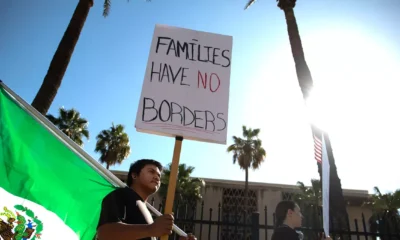arizona
The Battle Against Arizona’s LGBTQ+ Rights Bills: Tactics Uncovered

This year’s legislative session in Arizona has seen Democrats introduce 15 bills intended to expand and secure rights for LGBTQ+ individuals. These initiatives aimed to protect same-sex marriage, ensure workplace protections, and update laws that portray LGBTQ+ citizens negatively.
As the session draws to a close, none of these bills are under consideration. Most of them were effectively sidelined due to a lack of support from Republican leadership, which opted not to allow them to proceed.
According to the Williams Institute at UCLA, Arizona is home to over 250,000 LGBTQ+ members. Nonetheless, for multiple legislative sessions, efforts to secure equal legal protections have faced obstruction right from the start, stifled before they could even reach public debate.
This situation arises from Arizona’s legislative structure, where a small group of lawmakers can halt bills without debate or votes, eliminating the need for public accountability.
The legislative process generally consists of several key steps. Initially, a lawmaker submits a bill, which is then subject to the leadership of the majority party. They decide which bills to assign to committees, often choosing to bypass those they oppose. If assigned, committee chairs, also selected by leadership, can prevent scheduling discussions or votes.
Even if a bill survives these initial hurdles, the Rules Committee chair, handpicked by the leadership, can obstruct it from advancing. Thus, Republican leaders can completely block LGBTQ+ rights bills without ever needing to justify their actions.
Advocates and some lawmakers highlight concerns about this process, questioning whether it can be deemed democratic when representatives of a significant population can’t even bring their proposals to the table. Melinda Iyer, co-founder of Civic Engagement Beyond Voting, remarked, “The system gives the majority an insane amount of power.” She further explained that the speaker or Senate president has the unilateral authority to decide the fate of proposed legislation.
An example of this is when Senate President Warren Petersen assigned a bill aimed at enshrining same-sex marriage as a constitutional right in Arizona to a committee chaired by Sen. Wendy Rogers. This bill sought to secure marriage equality in the face of potential Supreme Court changes but never saw the light of day in the committee.
In the House, similar tactics were employed. Speaker Steve Montenegro opted not to assign a comparable bill to any committee, effectively extinguishing it. Bills can also be stifled by requiring them to pass through multiple committees, complicating their journey further.
This blockage isn’t confined to LGBTQ+ issues. Environmental advocates from Chispa Arizona experienced similar frustrations when their proposal for increased urban tree planting failed to gain any hearing at all.
Nuvia Enriquez, communications director for Chispa Arizona, expressed her frustration, saying, “To have legislators not even give it an opportunity to be discussed is definitely frustrating.” Their organization has been compelled to resort to advocacy efforts to push for legislative discussions.
Inside the Capitol, lawmakers sometimes attempt to amend stalled bills, but success is rare. Representative Betty Villegas (D-Tucson) earlier tried to amend an anti-LGBTQ+ bill but couldn’t get the necessary approval in committee.
House Minority Leader Oscar De Los Santos (D-Phoenix) criticized the legislative process for favoring the majority party, which he argues undermines the representation of millions in Arizona. He stated, “If people found out how this place works, they’d be horrified. This is completely not how representative government is supposed to work.”


















